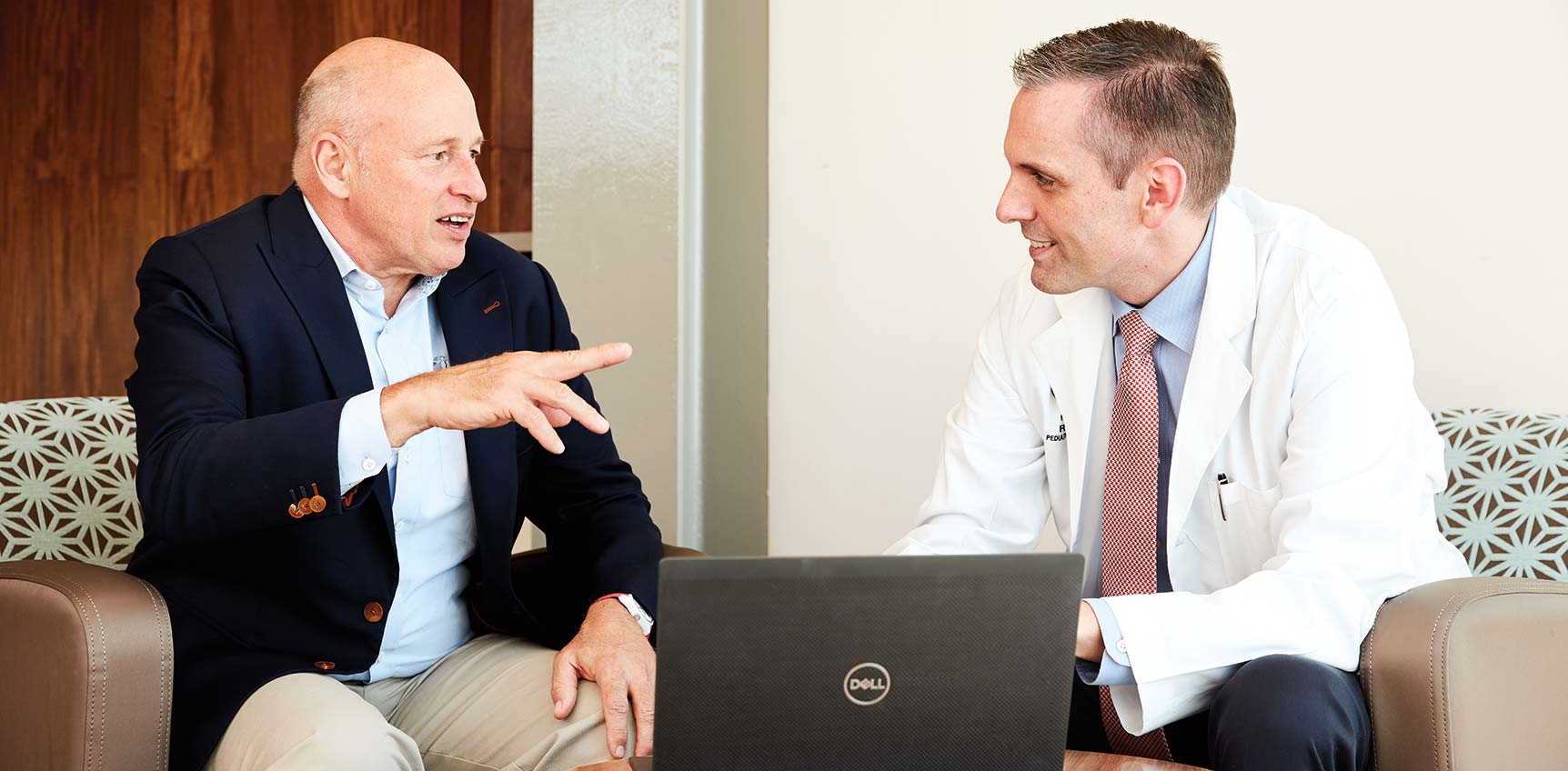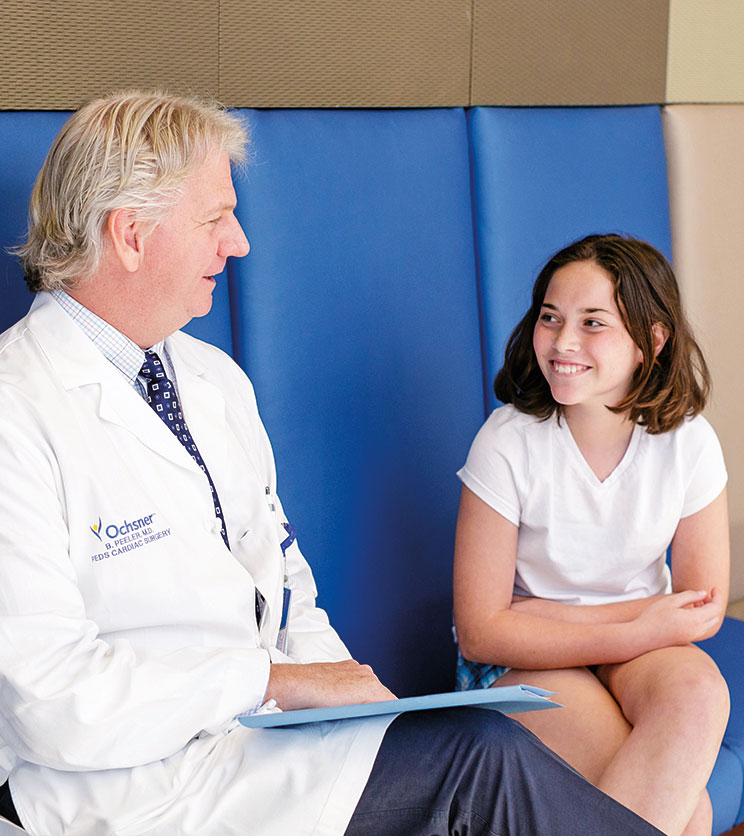Ochsner Health continues to grow its specialized capabilities and earn national recognition for excellence in pediatric care. Dr. Lennarz and Dr. Himes discuss what has contributed to that success — and the new opportunities ahead to better serve children and families.

Dr. Billy Lennarz and Dr. Ryan Himes are part of the nationally ranked pediatrics program at Ochsner Hospital for Children.
Q Over the past several years Ochsner Hospital for Children consistently
has been nationally ranked in multiple pediatric specialties. What’s
driving these exceptional results?
Dr. Lennarz: There are two things that distinguish Ochsner’s pediatric capabilities: quality and complexity. We certainly want to be there for every family that needs us for routine pediatric care. But what sets Ochsner apart from other healthcare systems in our region is our expertise and emphasis on handling the most complex cases, and on achieving outstanding quality measures while delivering that care. Eight years ago, when Ochsner President and CEO Warner Thomas and our Board decided to make pediatrics a center of excellence, they posed the question: Why can’t Louisiana have nationally recognized, top-quality pediatric care? Since then we have continued to strengthen our capabilities in specialties like cardiology, gastroenterology, neurology and child development. We benchmark our quality performance against the very best programs in the nation — and we measure up very well. The complexity of these subspecialties requires that we attract the very best talent — clinicians like Dr. Himes, a nationally renowned specialist in pediatric liver disease, who joined us in 2019.
Q Dr. Himes, the program you lead offers unique capabilities
in the region. What are some of the highlights?
Dr. Himes: Parents expect their children with rare medical conditions to be taken care of by physicians with deep expertise, who have seen and treated that condition before many times, and know the bad things that can happen and how to avoid them. I came to Ochsner from Texas Children’s, one of the largest volume pediatric liver programs in the U.S., and my view is that kids shouldn’t have to leave Louisiana for that level of care. Ochsner Hospital for Children is the most experienced active pediatric liver transplant program in the Gulf South. Over 150 infants and children have a second chance at life thanks to the work of our physicians and surgeons. We’ve recently added to our GI team Dr. Matthew Giefer, who is one of a handful of experts in pancreas disease in children and is renowned for his ability to perform therapeutic endoscopy in a procedure called ERCP in kids. It’s a type of endoscopy where he can access the pancreas and the biliary tree with a noninvasive scope-type tool. We can now offer families these services that were simply unavailable in the state even a year ago.
Q How is Ochsner helping provide greater access to
quality healthcare for children in the Gulf South?
Dr. Lennarz: It’s vital that we leverage our specialized expertise across multiple locations to serve individual communities and make it easier on the families who rely on our care. Our multipronged approach starts with our Children’s Hospital in New Orleans and at Ochsner Baptist for the NICU, then extends to 11 satellite clinics. There, we rotate the subspecialists to communities that are all within about an hour of New Orleans, including places like Biloxi, Covington and Houma. We also have pediatric multispecialty hubs that are permanent, with resident specialists on site full time. These include Monroe and Lafayette, and we’re in the process of developing a robust ambulatory pediatric multispecialty center in Baton Rouge at The Grove.
Dr. Himes: The final prong is the virtual one, which is accelerating rapidly. So, for example, we might be treating a child in Mississippi for inflammatory bowel disease, and today we can effectively do our follow-up visit, review lab results, adjust medications and plan next steps through a virtual visit. We continue to look for opportunities to deliver excellent care with the same level of quality virtually — reaching more patients with specialized care where they live.
A Destination for Pediatric Cardiac Care
Board-certified congenital cardiac surgeon Dr. Benjamin Peeler serves as Chief of the Ochsner Hospital for Children’s Pediatric and Adult Congenital Cardiac Surgery Program. There, he and his team provide patients with access to the most advanced treatments and technologies such as single ventricle repair with the Norwood procedure, valvular repair, ventricular assist device (VAD) implantation and heart transplants. Since 2017, this program has continued to surpass national averages for surgical outcomes. Notably, 2019 marked the third year running that the program achieved a 100% survival for neonatal heart surgery (ages 0-30 days). The continued success of this program is one of the many reasons Ochsner Hospital for Children is a destination for pediatric cardiac care in the Gulf South and beyond. Additionally, it is a major driver to Ochsner Hospital for Children’s standing as the only children’s hospital in Louisiana or Mississippi to be nationally ranked for pediatric cardiology and heart surgery by U.S. News & World Report.

Dr. Benjamin Peeler’s leadership has grown Ochsner’s Pediatric and Adult Congenital Cardiac Surgery Program among the nation’s most advanced.
Q What does the future hold for
Ochsner Hospital for Children?
Dr. Lennarz: For more than 40 years Ochsner’s signature pediatric specialty has been cardiology and cardiac surgery, with success rates in pediatric cardiac surgery that are among the best in the nation. We’re now taking a page from that playbook to build additional pediatric subspecialties not only in liver and pancreas disease, but in areas like neurology and child development. Two years ago, we opened the Boh Center for Child Development, the only interdisciplinary developmental pediatric center in two states, and since then demand for its services has simply exploded. Every few months we’re creating a new interdisciplinary clinic and bringing on new specialists. The latest is a feeding disorders clinic for children who are medically highly complex, have suffered longstanding hospitalizations as young babies, and never developed the neuromotor functions to eat, so they end up with gastrostomy tubes. But with the right teams put in place, these children can go from that situation to eating normally. There are really only a few highly developed programs in the country that do this, and we are soon to be one of them.
